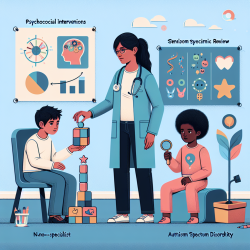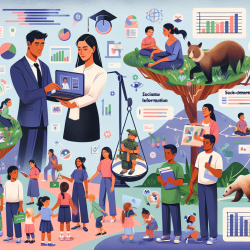The systematic review titled Non-Specialist Psychosocial Interventions for Children and Adolescents with Intellectual Disability or Lower-Functioning Autism Spectrum Disorders: A Systematic Review provides significant insights into effective interventions delivered by non-specialist care providers. This review is particularly crucial for practitioners working in resource-limited settings, where access to specialists is often scarce. Here, we delve into the key findings and discuss how practitioners can leverage these insights to improve their skills and outcomes for children with intellectual disabilities (ID) or lower-functioning autism spectrum disorders (ASD).
Key Findings
The review analyzed 29 studies involving 1,305 participants, with a focus on interventions delivered by non-specialist providers such as teachers, aides, and parents. The key findings can be summarized as follows:
- Behavior Analytic Interventions: These interventions showed the best outcomes for development and daily skills, especially for children with moderate to severe intellectual impairment. Effect sizes were robust, particularly for younger children (under 6 years old).
- Cognitive Rehabilitation, Training, and Support: These interventions were most effective for improving developmental outcomes in children aged 6-11 years. School performance outcomes were mixed, indicating the need for further research in this area.
- Parent Training Interventions: These interventions had the strongest evidence from randomized controlled trials. They were most effective for improving developmental, behavioral, and family outcomes, particularly when conducted in clinical settings.
Implications for Practitioners
For practitioners, these findings underscore the importance of implementing evidence-based interventions. Here are some practical steps to consider:
- Adopt Behavior Analytic Techniques: For younger children with ID or ASD, incorporating behavior analytic techniques can significantly improve developmental and daily skills. These interventions can be effectively delivered in both home and school settings.
- Utilize Cognitive Rehabilitation: For older children, especially those in primary school, cognitive rehabilitation interventions can be beneficial. Focus on interventions that target specific curricular areas to enhance school performance.
- Engage in Parent Training Programs: Parent training interventions are highly effective and can be delivered with lower treatment densities. These programs empower parents to provide therapy services, leading to better developmental and behavioral outcomes for their children.
Encouraging Further Research
While the review provides robust evidence for the effectiveness of non-specialist interventions, there are areas that require further research. Practitioners are encouraged to contribute to the evidence base by engaging in research activities, particularly in low- and middle-income countries (LMICs). Future studies should focus on:
- Using randomized controlled trial designs to increase confidence in intervention effects.
- Investigating the effectiveness of capacity-building strategies, including e-health approaches for training and supervision.
- Exploring delivery strategies and resource requirements for providing psychosocial interventions in primary health care systems.
To read the original research paper, please follow this link: Non-Specialist Psychosocial Interventions for Children and Adolescents with Intellectual Disability or Lower-Functioning Autism Spectrum Disorders: A Systematic Review.










